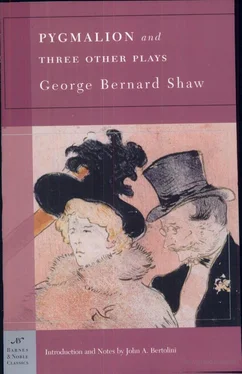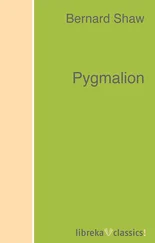German bacteriologist and Nobel laureate Robert Koch (1843 — 1910) developed tuberculin, a substance to diagnose tuberculosis.
Measurement of the amount of opsonin in the blood; opsonin is a constituent of the blood that helps phagocytes (such as white blood cells) destroy disease.
Samuel Christian Hahnemann (1755 — 1843), German physician who introduced homeopathy (treatment of disease by introducing small doses of a remedy that produce symptoms of the disease in a healthy person).
Thomas Babington Macaulay (1800 — 1859), a much-admired and -quoted British historian and author.
Cupping was a medical practice of drawing blood to the surface of the body with warmed glass vessels; firing was cauterizing a wound with a heated iron.
Last lines of “Ode on a Distant Prospect of Eton College,” by English poet Thomas Gray (1716 — 1771).
Paraphrase of “Essay on Criticism,” by English poet Alexander Pope (1688 — 1744); Shaw substituted “knowledge” for Pope’s “learning.”
It is the Declaration of Independence, not the Constitution, that states all men “are endowed... with certain unalienable Rights, that among these are Life, Liberty and the Pursuit of Happiness.”
Reference to English essayist Charles Lamb’s “A Dissertation on Roast Pig,” from Essays of Elia (1823).
X rays; discovered by German physicist Wilhelm Konrad Rontgen in 1895.
Days every three months when rent and other payments are due.
Conducting a service of thanksgiving for a new mother.
Reference to Proverbs 13:24: “He that spareth his rod hateth his son” (KJV).
Device that attaches to the wrist to record the pulse graphically on paper.
French author Marquis de Sade (1740 — 1814), known for his licentious novels and pamphlets, was imprisoned for numerous sex offenses; the word sadism is derived from his name.
English trader and philanthropist (1712 — 1786) said to have introduced the umbrella to England.
Reference to an accident in 1893 between two ships of the British Royal Navy — HMS Victoria and HMS Camperdown — in which many drowned.
Edward Jenner (1749 — 1823) English physician who discovered the smallpox vaccine.
English writer (1689-1762) who introduced inoculation for smallpox to England, after observing it in Turkey.
Praisers of times past (Latin).
This could be reserved by wealthy people for an annual payment.
Epidemic of bubonic plague in 1685 that killed tens of thousands of people.
Professional organization for physicians in Britain.
Company doctors paid through workers’ contributions.
Sir James Paget (1814 — 1899), renowned English surgeon and pathologist.
American novelist (0856- I898).
Reference to The Doctor, a painting by Sir Luke Fildes ( 1844-1927), based on the death of his son, that depicts a doctor keeping watch at the bedside of a sick child.
For lack of a better (French).
Infections of the finger or toe.
Staying in musty rooms.
Former name of Hawaii.
Superstitious practice using magic and spells.
Martyr (272? — 205) during the reign of Roman emperor Diocletian; in Naples, a phial thought to contain his dried blood is said to liquefy each year.
The writings of Russian biologist Ilya Metchnikoff ( 1845-I 9 16) include Immunity in Infectious Diseases (1905) and The Nature of Man (1903).
London public-health board established in I867 that operated, among other things, specialist hospitals for infectious diseases and tuberculosis.
Medicinal syrup derived from the squill plant, a bulbous herb.
hus Feste gloats over Malvolio’s humiliation in Shakespeare’s Twelfth Night (act 5,cene I ) .
Hypothetical substance thought to be released through burning, a theory disproved by French chemist Antoine Lavoisier (1743- 1794).
In Moliere’s play The Imaginary Invalid (1673) a doctor who disdains such new fangled theories as circulation of the blood.
Sixteenth-century German alchemist and physician.
Tall mirror that covers the wall space between two windows.
Transversely corded fabric.
Chandelier with gas burners.
Having a projecting breastbone.
Abbreviated version of the Latin phrase infra dignitatem, which means “beneath one’s dignity.”
Licentiate of the Royal College of Physicians, Member of the Royal College of Surgeons.
Term for winning a backgammon game before the opponent removes any pieces from the board, thereby earning double points.
Nut-shaped mass of tissue.
Poisonous bacteria that can cause food poisoning.
Appearing moral, but being immoral (see the Bible, Matthew 23:27, KJV).
Specialist.
Quotation from Alexander Pope’s “Essay on Criticism,” this time accurate (see footnote to page 196).
B.B.’s memory of the laws of Medes and Persians from the Bible (see Daniel 6:8-15) fails, so he improvises.
Informal marriage certificate.
Life-size dummy with movable limbs.
Lamp that burns volatile liquid fuel such as alcohol, sometimes in conjunction with a container, for heating substances.
Heavy brownish silk fabric.
Meaning “pay up”; a term derived from a mining practice of payment by gold dust.
Maid in charge of the room where liqueurs and cakes are stored.
Does not represent any particular religion.
Indignation; resentment.
Scottish novelist and dramatist J.M. Barrie, best known for his character Peter Pan, was a friend of Shaw; Better Dead (1887) is his first novel.
Proverbial saying that derives from English author Francis Bacon’s essay “On Boldness” (from Essays, 1625).
Читать дальше












